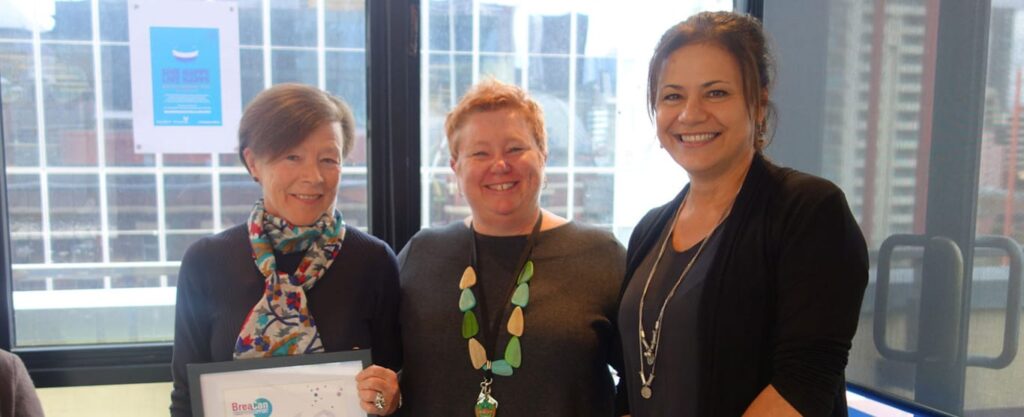Pam's thoughts on living well with metastatic cancer

Pam with Kellie Holland, Team Leader Operations/Volunteer Coordinator and Rita Butera, ex-CEO of Women's Health Victoria
Pam was a Counterpart Peer Support Volunteer for more than 15 years, and she lived with metastatic breast cancer for over 10 years. Sadly, Pam died in December 2022 as a result of a condition not related to her breast cancer. She contributed to Counterpart enormously over the years and is remembered and greatly missed.
Here Pam shared her thoughts about the value of peer support after a metastatic cancer diagnosis.
Pam (Peer Support Volunteer)
Any cancer diagnosis is devastating, but how much more so for those of us who have been diagnosed with metastatic disease? We are told in no uncertain terms that our cancer is incurable, that at best we will be on some kind of treatment for the rest of our lives.
This time of diagnosis is very difficult, with most women experiencing shock, denial, anger, grief and loss. There is generally an overwhelming feeling of isolation, as women try to navigate the complexities of the health system, as well as coping with the psychological, social, economic and emotional impacts of metastatic cancer. Connection with other women in a similar situation can be enormously helpful. Sharing our stories can be supportive and reassuring, as we learn how to live with this disease.
One of the first concerns for most women is in regard to prognosis. It takes time to realise that it is not a death sentence. We come to accept that in many cases, metastatic cancer can be managed like a chronic disease. There are so many different treatments and new developments, and every individual will respond in different ways. Living with uncertainty is hard, but it can also be a source of hope – we all hope to beat the odds and are heartened by hearing of long-term survivors.
Of course, some women may have a more aggressive form of cancer and most will go through difficult times, when there is progression and different treatments must be tried. These are times when even more support is needed and contact with others can allow women to feel less isolated, to share strategies for making the most of their situations. Many women show amazing resilience, courage and grace in coming to terms with a poor prognosis and finding peace towards the end of life.
There are many areas in which women with metastatic cancer need support. Organisations like Counterpart can direct women to reliable sources of information and connect them to other supportive networks. All our Peer Support Volunteers have experienced cancer and are available to lend an empathic listening ear – there are times when women just need to vent, to know their voices are heard.
We often want to protect our families and friends, and may find talking to someone outside our own circle very helpful. It can be good to start to explore issues of concern in a safe, neutral space.
Making connections with other women living with metastatic cancer enables us to share experiences, with different treatments, dealing with side effects, financial issues including employment, accessing super and insurance, complementary therapies, access to counselling, the role of palliative care, the impact on family and friends… the list goes on. This shared experience has been very powerful for me personally, as well as for many of the women whose stories I have been privileged to hear.
Find out more
How we support women with advanced/metastatic cancer
Contact us to speak with a Peer Support Volunteer
If our phone is unattended, leave a message and we will call you back during peer support hours ( 10am–2pm, Monday, Wednesday and Thursday).






